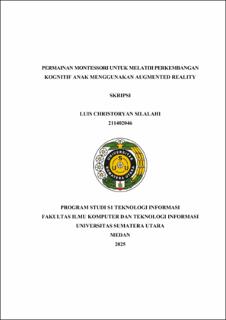Permainan Montessori untuk Melatih Perkembangan Kognitif Anak Menggunakan Augmented Reality
Montessori Games to Train Children's Cognitive Development using Augmented Reality

Date
2025Author
Silalahi, Luis Christoryan
Advisor(s)
Andayani, Ulfi
Efendi, Syahril
Metadata
Show full item recordAbstract
Early childhood is a critical stage in cognitive development that requires stimulation through appropriate learning approaches. One suitable method is the Montessori approach, which encourages children to learn actively and independently through exploration. This study aims to design an educational game application based on the Montessori method using Augmented Reality (AR) to enhance the cognitive abilities of children aged 2–7 years. The application includes three Montessori games: Inset Geometry, Geometry Puzzle, and Pink Tower, which are visualized as interactive 3D objects through AR marker scanning. Children can scan markers and interact with virtual objects in an immersive environment. The application was developed using Unity 3D and the Vuforia SDK, with 3D object modeling created in Blender. Each game is designed to train children's symbolic, spatial, and logical thinking skills. Gamification elements such as animations and sound effects are added as positive feedback. The Sattolo algorithm is used to randomize object positions and prevent repetitive game patterns. User testing results show that the application meets quality criteria in the aspects of usability, interaction, and content understanding. For the Inset Geometry game, user satisfaction increased from 76.19% to 93.09%, for the Geometry Puzzle from 75.48% to 90.83%, and for the Pink Tower from 70.95% to 89.40%. Expert evaluations indicate scores of 91.07% for Inset Geometry, 94.64% for Geometry Puzzle, and 87.5% for Pink Tower, with an overall average of 91.74%. These results suggest that the application is feasible to be used as an effective interactive learning medium for early childhood.
Collections
- Undergraduate Theses [883]
